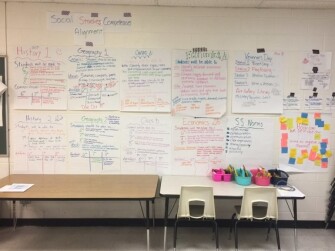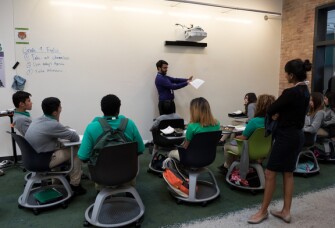
Three middle school students perch on stools in the library of Rancho Minerva Middle School in Vista, CA. The room is packed with educators from as far away as Salem, MA. They take notes, snap pictures on their phones, and bombard the student panel with questions: How do you experience personalized learning? What do you like best about your school? What would you change?
Educators from Colorado, Illinois, California, and Kentucky have formed a circle of desks to debrief a day spent at Valor Collegiate in Nashville, TN. “It’s so impressive to hear students articulate how their behaviors impact their peers and vice versa--many adults cannot do this!” says one visitor. “I’m definitely going to take back how important it is for adults to do their own character building work before doing it with students,” says another. Still others ask probing questions of their hosts, like “How do you integrate the strengths of your social-emotional program with your academic classes?”
Trailed by a half-a-dozen visiting teachers, a senior walks backwards through the halls of High Tech High in Chula Vista, CA. Like a docent at a student-created museum, she points to the student products that line the walls, dangle from the ceilings, and spill out into the courtyards. She knows which class created the artifacts, and she can articulate each project’s learning goals. Pausing by a wall covered with floor plans and photographs of building construction, she explains with a grin, “This was my project from last year. These are the tiny homes we created for local artists to use as studios.”
These three vignettes capture moments from NGLC Learning Excursions this past year. In 2017 educators from throughout the NGLC grantee network came together to see next gen learning in action: observing classrooms, talking to students and educators, examining student products, and problem-solving around implementation challenges.
January is the season for resolutions, and we would be remiss not to suggest at least one, so here it is: make time in your 2018 professional learning calendar to either visit a next gen learning school or host a visit at your site. For this edition of Friday Focus: Practitioner’s Guide to Next Gen Learning, we spoke to leaders of schools in the NGLC network who have experience both as guests and hosts of school visits. We asked them to share their thoughts on:
- The professional learning benefits for both visiting educators and host schools
- Stories of memorable visits and how they shaped mindset or practice
- Advice and resources for making the most of school visit experiences
Bold Ideas in Motion
That’s what Ami Gandhi sees when she visits other innovative schools. Ami is the Director of Innovation and Collaboration at Intrinsic Schools, a network of public charter schools in Chicago, Illinois. Noting that there are many personalized learning frameworks available, Ami cites the value of seeing the “variety of ways to define it for your school.” According to Ami, seeing practice in action at different schools--those new to next gen learning and those in year five of implementation, both district schools and charter schools--"helps us think more creatively and connect theory to practice. It allows us to see what’s possible, and that’s very powerful.”
“It’s very rejuvenating to be a visitor at another school” as well, she reports. To illustrate, Ami tells the story of a December visit to Lee Elementary, a district school on the other side of Chicago that was piloting the Summit Learning Platform. Ami recounts what happened when one of the Intrinsic teachers sat down to talk to a student: “His mind was blown when he heard what the student’s day was like. He got so excited about student agency, how students could articulate what they were doing and said they loved going to school.” Right after that visit, Ami reports, that educator organized another group of teachers to go back to Lee to learn more.
Seeing is Believing
This is more than a familiar saying; it’s the name of a new kind of professional learning at Colorado’s Thompson School District. As part of a system-wide shift to personalized and competency-based learning, district and school leaders have launched a series of “Seeing is Believing” tours of district schools. In place of meeting in district office conference rooms, for example, Thompson’s school administrators design professional learning experiences in schools throughout the district, closer to the work of teaching and learning. Many of the events are also open to parents, community members, and educators from surrounding districts.
Jeri Crispe, Thompson’s Director of Secondary Education, describes this school-based, collaborative professional learning as something “uplifting and rare. It looks and feels different from any PL I’ve been a part of in 20 years.” Jeri contrasts traditional “sit and get” professional learning to the “hands-on and totally, authentically engaged” experience of being in colleagues’ schools.
Jeri’s enthusiasm about the tours is palpable. Spending a day learning about another school, she says, gives educators and school leaders “the opportunity to collaborate around design thinking and innovation, talk to students and teachers, observe classrooms, and share tools and resources. To explore possibilities and see what is already in place that we can build on.”

The Value of a New Set of Eyes
It’s probably not surprising that educators tout the value of visiting other schools in order to learn new ways to implement personalized learning and other innovations. What’s perhaps less obvious is the value for the host schools. All of the leaders we spoke to pointed to this benefit, and they have created structures for getting feedback from visitors, either with a form like this one from Intrinsic schools or by including debrief time in the day’s agenda.
According to Ami, hosting fellow educators “makes us crisper in our purpose and how we are tying practice to outcomes for students. They know your intentions and they can tell you what they are seeing. This is hard to do when you are in the weeds. The tours give you a better sense of strength areas and what really needs to be improved.”

Building professional networks
The interactive and collaborative nature of school visits also fosters strong relationships among colleagues engaged in the work of next gen learning. Jeri notes that for Thompson, the “Seeing is Believing” tours helped the district “come together as a system and see ourselves as one 13-year journey instead of 13 one-year journeys” toward reaching shared goals for students like social-emotional learning and college- and-career-ready competencies. Through the school tours, she says, “we created a sense of ‘we believe in ourselves as a system.’”
LeViis Haney, the principal at Chicago Public Schools’ Lovett Elementary, an NGLC Regional Funds grantee supported by LEAP Innovations, also emphasizes this benefit. In addition to receiving useful feedback, he points to how visits “connect our teachers with other educators both across the city as well as across the country. Those connections have been cultivated into relationships that have become support networks for us as we have expanded and scaled our work.”
LeViis adds that knowing that your school is serving as a model for others can also serve as a reminder to your school and broader community that “something special is happening here. It has helped to elevate the work for teachers and administrators as well as the students themselves. Being a part of a larger context of learning has helped to bring a deeper level of meaning for our work.”
Advice to School Hosts and Visitors
To get the most out of hosting a site visit, Ami advises educators to “be candid and humble. Show yourself to be as much of a learner as the visitors. Don’t try to look like year ten in year one.” She recommends that hosts “be reflective of their own journey” and include in the agenda time for collaboration around a problem of practice.
Echoing this same frankness, LeViis advises hosts “not to be afraid to open up your building. Leverage those opportunities to elevate everyone’s work. Give visitors the opportunity to give honest feedback--outside perspectives can be powerful for teams.”
Jeri makes the connection between hosting school tours and modeling mindsets and behaviors for students: “We expect kids to collaborate, take risks, ask for feedback, and be vulnerable, but do we do that? Are we taking that risk of opening up our doors and asking other teachers and administrators for feedback? We do with those we trust, but rarely do we step that far out of our comfort zone to become vulnerable.”
For visitors to other schools, Ami suggests that educators start off by asking foundational questions like “How do you make decisions?” and “How do you prioritize?” She recommends that visitors inquire about core values and beliefs and how practice and operations support them before “getting down to the tactical to ask questions like ‘how many minutes?’”
And just in case you are not yet convinced of the value of school visits, we’ll close with these motivating words from LeViis: “My advice is to go see amazing things happening in other schools and do not be afraid to steal--I mean borrow--ideas! Have an open mind, and do not be afraid to ask questions. Give honest feedback so that you are helping to improve practice. Believe that you can implement new ideas in your schools/classrooms, but know that it will not happen overnight.”
Resources:
- Sample visit agenda from a tour of Intrinsic Schools, with information about the visiting school and the purpose of their visit
- Feedback form used after visits to Intrinsic Schools
- “School Information” folder, an exemplar collection of documents about Intrinsic Schools that illustrates what a host school might share with participants before a visit
- Sample NGLC Learning Excursion agenda, with structured, debrief time and links to school-specific agendas
- NGLC Learning Excursions: A phenomenal experience, a 2-minute video that captures host and visitor perspectives from the NGLC Learning Excursion to San Diego-area schools in October 2017
- We See and Believe in Thompson School District, an Education Week blog post by school leaders from Thompson School District